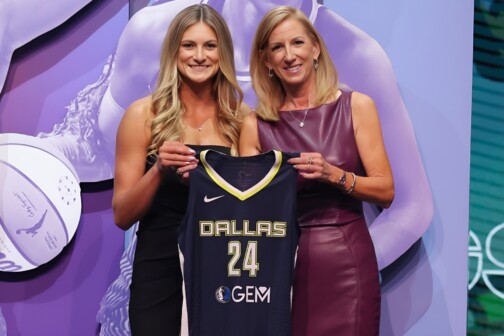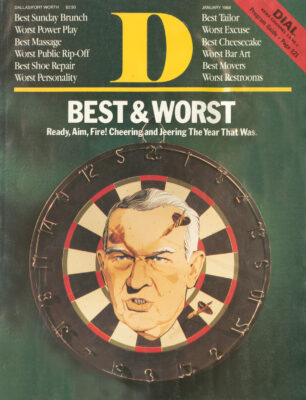IN RETROSPECT, THE SCENE IS almost laughable. The date is April 15,1980. Hunkered down in a booth at CoCo’s at LBJ and Midway are the fast-talking guy from Chicago, the sophisticated Dallas lawyer, and some white-haired guy with “exotics” on his feet and his ten-gallon chapeau at his side. They are scribbling some numbers-numbers with a lot of zeroes-on a napkin. This is the forming of the Executive Committee of the Dallas Mavericks, the final touches on a contract, Donald Carter style, that will bring an NBA basketball franchise to Dallas. The numbers total $12 million-a staggering sum, at the time the most ever paid for an NBA expansion team.
The Chicagoan-Norm Sonju- was almost spent. He had been working in Dallas for two years hoping for this very moment, but even as he’d pulled into the CoCo’s parking lot he thought all hope was gone. He had been horribly yanked around by the league office. They had upped the price on him three times, lowered his first draft pick to the eleventh choice instead of the traditional expansion number one, and in general made life very difficult. On top of all this, his original list of twenty-four investors had shrunk to less than five. Sonju was ready to give up.
Don Carter, the man in the boots, believes in commitment. Not just to causes, but to individuals. He too had been trying to bring the NBA to Dallas. Even before being introduced to Sonju the previous June, Carter had twice agreed in principle to buy NBA franchises, which he would have moved to Dallas. The league would not give approval. But so intent was Carter on moving a basketball team to Dallas that he paid the $100,000 for the expansion rights, simply to make sure no one slipped in the back door.
When Don Carter, now fifty-four, sees an honest man so committed to something, as Sonju was to the unborn Mavericks, he is moved. That evening at CoCo’s, Carter made up the difference from those who had dropped out, gaining 87 percent ownership of a franchise given little chance to survive, much less prosper. At the time only a handful of NBA teams were running in the black. The season was six months away. It would be July before they had a coach. They would finish their inaugural season with a dismal record of fifteen wins, sixty-seven losses.
Fact: Donald J. Carter had never seen an NBA game before entering into serious negotiations for a Dallas franchise. That’s one of many ironic footnotes in a story about a man, his business, and a franchise-all incredibly successful. He is a devout, born-again Christian (as is Sonju, the only general manager the team has had) who has survived both his own rambunctious youth and severe injuries in a plane crash to become one of Dallas’s greatest success stories. His business, Home Interiors and Gifts, did more than $500 million in business last year.
In only seven seasons, the Dallas Mavericks franchise has risen from three men and a restaurant napkin to the paradigm of what the NBA wants in ownership and organization. All expansion hopefuls are told to speak to the Mavericks first, just to get it straight. The Mavericks made money in their first season. They made the playoffs in their fourth, and in the 1986-87 season won fifty-five games. It now costs $32 million to get an NBA expansion team. In October 1987 the Phoenix Suns, a solid franchise for years that had recently suffered from drug scandals, were sold for a reported $44.5 million, but informed sources say it was more like $60 million. So figure the $12 million invested in the Mavericks in 1980 to be worth $70-80 million today. Good ol’ Donnie Joe.
When you meet Don Carter at his office, he comes to the reception area and greets you personally, presenting a smile and an outstretched hand before you can leave your seat. The hallways leading to his office are lined with company photos, just as a proud grandparent might smother a wall with the images of several generations. At first glance everything about him is homey and country. Perhaps this is his initial edge. According to Norm Sonju, as big city as they come. Don Carter is as shrewd and sophisticated a businessman as there is.
“The remarkable thing about Don,” Sonju said from his office recently, “is that he is so consistent. And boy. that is a luxury for someone in my position. I know how he will respond in certain situations, I know how to conduct my job and am aware of the standards he wants. I mean, he’s the boss. He could walk into my office and tell me to trade a player and I would have to do it. But he will never do that. You can’t imagine what that means to me.”
The family joke is that Carter bought the Mavericks for his wife. Linda. Don didn’t know much about basketball and whenever he and Linda watched a game, she would have to explain things to him. “I guess you could say I bought it for her.” he says with a wide smile, the only kind he seems to know. “But I was also trying to give something back to the community. Dallas has been very good to me.”
In a way, Carter is a living metaphor of the economic opportunity that has existed in this city for the past thirty years. When Don and his mother (the late and, to those who knew her, great Mrs. Mary Crowley) started their business with a $6,000 bank loan in 1957, Dallas was nowhere near the entrepreneurial paradise it would become. With Mrs. Crowley as the motivational and spiritual leader and Don as the business brain, the company grew to have its first million-dollar year in 1962. As Don says, “Mama and I had a good arrangement. She would try and give the company away, and I would try and keep it.”
Carter sees his company as an extended family. “I want my employees to be happy here. I want them to know this is my primary concern. If I ever felt they thought I was ignoring them so I could hang around with the ball team, I would adjust the way I participate in the Mavericks.” While Carter clearly enjoys the Mavericks, his reasons for ownership are not linked to the vicarious thrill of hobnobbing with professional athletes that so often causes problems with other teams.
Home Interiors and Gifts is the Tupper-ware of decorative accessories for the home, a monument to networking. Currently more than 800 managers and 36,000 displayers ply the Home Interiors trade in forty-nine states. With the help of ingenious, incentive-oriented sales drives, home parties, and the undying allegiance of employees to their leaders and their principles, the parent company has spawned offshoots (primarily managed by Service Industries Inc., of which Carter is president). These entail manufacturing decorative accessories, owning and leasing aircraft, real estate management and development, and owning an NBA franchise. (No bowling alleys, though; Don Carter does not own Don Carter Lanes!)
Don Carter knew little of basketball in 1980, but then, neither were most Dallas-ites aficionados of the NBA. Both of these situations have changed dramatically. Dallas is now considered a top NBA city, selling out Reunion Arena for practically every game. In fact, every game could be a sellout should the Mavericks ever choose to fill every seat with season ticket holders. (They hold back about a thousand seats for walk-up customers.) And Don Carter has become one of the most respected owners in the league.
“When we went up to the league office [in 1980], I think they were a little skeptical,” Carter says. “You know, with my cowboy hat and boots and all. But I told them to check me out. Ask anyone about me. Look as deep as you want.”
Other owners, executives, or media may have chuckled when Don was introduced to the league, but no one is chuckling now. Carter sits on the NBA’s finance and advisory committee and on the board of governors. According to Dave Barnett, the Mavericks play-by-play announcer, a few of Carter’s peers are even a bit jealous of him.
“Others wish their ownership was as intelligently aloof as Mr. Carter,” Barnett says. “He is interested enough to know he needs to be plugged in on most of the major decisions but he’s also intelligent enough to know he ought to listen in most cases to what basketball people say, which is a rarity. He knows where to draw the line and he doesn’t step over it. Also, this is an organization based as much on ethics as on talent, which had never been tried before. Mr. Carter has one of the two or three best ownership reputations in the league.”
The business approach Carter and Sonju bring to the Mavericks is a key to the organization’s success. Carter is owner. Sonju as GM is the business manager, an extraordinary detail man. Doug Adkins handles all legal matters. Rick Sund is head of basketball operations. They know their duties, and no one tries to do someone else’s job.
There are stories that circulate through the NBA of owners making trades at cocktail parties, of GMs having no control. This is not the Mavericks way, in part because neither Carter nor Sonju frequents the halls of imbibement. The Mavericks may be the most Christian-influenced organization in pro sports. Carter’s mother was the first woman to sit on Billy Graham’s board of directors. Ask Norm Sonju a question about his success and he will first tell you, pleasantly, that the credit goes to Jesus Christ. Incredibly, it was the Reverend W. A. Criswell, knowing that Carter had been trying to bring a franchise to Dallas, who told him to get in touch with a guy named Norm Sonju. Carter immediately called Doug Adkins, his longtime attorney, who arranged the meeting.
“Within minutes I knew he was the man I’d been looking for,” Carter says. He hired Sonju on the spot. Still, it took fourteen months to get the Mavericks deal finalized on a CoCo’s napkin.
Owning a sports franchise is different in important ways from running his other businesses, according to Carter. He says the difference is not in his fragile investments (players) or the constant media attention. He says cordially that he had not even given the press much thought.
“Home Interiors is a sales-motivated business. At the end of the year we evaluate and look forward to next year. We’ll try to expand as a team, create more jobs in areas of responsibility and manufacturing. I’ll never forget my first year with the Mavericks. When I stood in front of those twelve guys at the end of the season, I couldn’t give them a pep talk and say ’Boy, guys, wait till next year.’ Because we weren’t going to expand to fifteen or seventeen players; we could only have twelve, and at least four or five of them weren’t going to be here. That was the toughest thing. It hadn’t hit me when we first set out to buy a sports franchise. I couldn’t treat them as part of the future. Even if we win the championship, you figure the first-round pick is going to make the team. That constant change, for no fault of the player, was really hard to get used to.”
Even given those cold realities, the Mavericks have tried to build in Carter’s fashion. Being drafted by the Mavericks is like being added to the family. Carter meets all potential first-round picks before draft day to see if they are the type of individual the Mavericks want. “And I want them to want to come here,” he explains. “I want to be straight up and above board with them. They have to understand it’s no picnic here. They have to be comfortable in our environment, with our principles, what we stand for and what we expect. We don’t draft a first-round pick to trade him.” Of the twelve players currently on the roster, ten were Mavericks draft picks. Of the other two, Brad Davis has been with the team longer than any other player, and center James Donaldson, barring injury, figures to be in the middle a long time.
OF COURSE, CARTER KNOWS THAT OWNING a sports franchise is no bed of roses. The Four Horsemen of the Sports Apocalypse- injuries, egos, drugs, and salary problems- are always close at hand. The Mavericks’ image, though, has certainly been better than many teams. Steady increases in fan support and team success have helped the Mavs to neutralize their few setuocks through the years. This past year has been different, and the problems hit no one harder than Don Carter.
It started with an early exit from the 1987 playoffs, due largely to an injury to James Donaldson, their 7-foot-2 center, enforcer, and, as it turns out, leader. This abrupt end to the season was particularly devastating since the Mavs were coming off their best regular season ever. And there was Dick Motta, the team’s only coach for its first seven seasons. His contract with Don Carter was based on a handshake. At season’s end Motta inquired into some job openings, bringing stinging (and mostly unwarranted) criticism from the media. Whatever his reasons, Dick Motta “retired” from coaching on May 20, 1987.
“I told everyone I’d bought a black hat,” Carter jokes now. But it was no laughing matter at the time. “I was in total shock,” he recalls. “After that double devastation, I’m sure I had the blankest look on my face as any individual that’s ever lived. It took some reachin’ to find something good to look forward to.”
What was particularly tough was Motta, the favorite son, leaving the Mavericks family. Had Carter become too attached to his coach in a profession hardly known for stability? Perhaps, but Carter says that if the same relationship develops with John MacLeod, Motta’s successor (and Carter hopes it does), he will not back away. MacLeod too has a handshake contract with the owner, and he says it feels better than many written contracts he’s had.
Carter still refuses to say what final reasons Dick Motta gave for his resignation. “I’m not going to go into people’s opinions about loyalty,” Carter says. “But if you’re in my family then I’m in yours. Dick said he would call me in thirty days and it was probably thirty-one. It just took so much off of me. After that I was able to get back involved. I was able to meet John [MacLeod] and get him hired. And coach thought John was the man for the job, too,” he says, revealing that he had consulted Motta before hiring MacLeod. Motta and Carter still remain good friends.
The coaching change was followed up by rumors that Roy Tarpley, the 7-foot forward who had just made the league’s all-rookie team, was experiencing substance abuse problems with alcohol and cocaine. Later, it was revealed that Tarpley had admitted himself to a drug treatment center. Perhaps worse, it developed that the Mavericks had known about Tarpley’s problem.
Rumors had circulated, even when Tarpley was drafted in 1986, that he had been an abuser in college. Given the meticulous research the Mavericks do for all draft picks, it was clear they knew something about the player’s habits. What had never been clear was how much they knew. It turns out Tarpley had been honest with them from day one. Carter explains by using, as he likes to do, an analogy:
“The key is that we thought it was manageable. When Roy came out of college he told us he had a problem with speeding, and he was willing for us to put radar out on his highway, because if the radar wasn’t there he may speed again. And if he knew the radar was there, he wouldn’t speed. But NBA clubs don’t have that kind of authority. We all felt that a healthy environment would help him help himself. It’s just that now the solution is much more hands-on. Like attending Al-Anon meetings with Roy, Making sure his after-care program is on track.
“The other day as I was driving into work I just felt I needed to go shake Roy’s hand. I don’t like to go across the street [where the Mavericks practice, just a couple of hundred yards from Carter’s office] when I need to be here. I don’t like the way that looks to my employees. But I just wanted to let him know we are by his side.”
Norm Sonju describes Don Carter as someone who experiences life on the edge. Carter readily admits a fondness for the adrenaline surge; he likes to drive motorcycles and fly airplanes. He was lucky to survive his teens, he says. Mavericks fans get a glimpse of that wilder side during home games. Watching Carter, who sits at mid-court directly across from the team benches, can be as exhilarating as watching the game. Whether he’s fast-breaking along the sidelines during time-outs, greeting friends, elbowing or sharing a laugh with other courtside denizens, or flying out of his chair to celebrate a great play, Carter’s presence is commanding and energetic. At this season’s home opener, Derek Harper launched a twenty-five-foot jumper to win it at the buzzer. Carter was shouting and hopping up and down like a kid who just got his first pony.
What Carter wants more than anything for the Mavericks is an NBA championship, which means winning four playoff series and toppling the mighty Los Angeles Lakers, now the world champs.
“What I think we need to do,” he explains in a rare foray into basketball theory for public consumption, “is use the first three-quarters of the season to make our statement, then have the last quarter of the season be a training camp for the playoffs. The playoffs are what count. To be ready for the playoffs, there has to be a whole new commitment to mental and physical toughness.”
Carter knows something about toughness. By his own admission, he was something of a hell-raiser in his youth. Growing up in Dallas, he loved fast cars and hated rich kids. He dropped out of Dallas Crozier Tech High School to spend his time working at a gas station and fiddling with engines, savoring the many times he left Highland Park hot rodders in his taillights. “When I was about eight years old I heard a lesson on how forgiving Jesus was. I figured if that was the case then I had it made. I’d live wild and get forgiven later. I abused that forgiveness for years. But I tell you what, I might have known I was hurtin’ God, but I would never hurt my Mama.”
Carter entered the Air Force when he was eighteen for a four-year stint that he says gave him a new direction in life. Carter now finds it especially ironic that in many ways he has become what he used to despise-a wealthy, respected, solid citizen. The Carters have five children, two of them adopted. But Donald Carter wasn’t going to raise any rich kids. He gave them food, clothes, and an education, but “if they wanted a vehicle, they had to buy it.” Two sons now work for Home Interiors and Gifts.
“It was jealousy.” he now admits about his feelings for rich kids, “but I never would have told you that at the time. I guess I thought they were lucky and didn’t know it.” To help him maintain his perspective on things. Carter keeps a semi-truck in his warehouse that he occasionally takes on cross-country trips. “When I pull up to a truck stop and I’ve got it parked in the wrong place. I’m not Don Carter. I’m the guy with his truck in the wrong place.”
What Don and “Mama” did together is a success story of outrageous proportions. Mary Crowlev, who died of cancer in June 1986, was a spiritual inspiration to thousands. “If the place was burning down,” Carter said one afternoon in an office filled with memorabilia, from autographed basketballs to family photos, “this is the one thing I’d save.” He was holding his mother’s Bible. “What is written in the margins are teachings for a lifetime.” Those close to him fee! he has relaxed, become more reflective since his mother’s death, but her absence has also meant more work for him.
Don and Linda Carter chair many charitable events, which is not unusual for people in their position. But there is a side to Carter that others never see, and that’s by design. “He helps thousands of people,” Norm Sonju says. “I’ll hear of something he’s done and ask him about it and he’ll ask, ’How did you know about that?’ He honestly doesn’t want anyone to know.”
However, events sometimes reveal the depth of his character, whether he likes it or not. Such was the case on December 28, 1977. when the airplane Carter was piloting crashed at Addison Airport.
The crash is difficult for Carter to talk about, even ten years after the fact. There was little hope that Carter would survive. The left side of his face was a bloody mess, his jaw shattered. The only thing keeping his left foot in the vicinity of his left leg was his boot. He lay in the emergency room, worked on by frantic doctors and nurses who were resigning themselves to the worst. When the two employees who had been waiting for him at the office arrived at the hospital, they learned that his plane had come out of the fog and clipped a high wire, stalled, and plunged into one of the airport’s strobe lights. Entering the emergency area, the two employees looked in on Carter, bloody but conscious. He spotted them and in true Carter fashion, managed a thumbs up sign.
Carter was unable to speak, but one of the employees knew sign language-her deaf parents had worked for Carter. (Carter says simply, “We have a lot of silent individuals working for us.”) The woman began to spell words to Carter, who with his one good hand signed back in the same way. As Carter slipped in and out of consciousness over the next several hours, his one link with the world was possible because he had refused to see the limitations in others, only the potential.
But perhaps that’s not surprising. “Potential” is a word that follows the Maverickswherever they go. They are one of the youngest and most talented teams in the NBA.”Results” is a word Don Carter knows. Putthe two together and you have a winner, DonCarter style.
Related Articles

Commercial Real Estate
Why Mikial Onu is Pursuing Opportunities in Southern Dallas with The Adaline
This week marks the groundbreaking of the 12-acre mixed-use development by Onu Ventures near the intersection of Interstates 45 and 20.
By Audrey Henvey and Proud Papa Mav

D CEO Events
Get Tickets Now: D CEO’s 2024 Women’s Leadership Symposium “Redefining Ambition”
The symposium, which will take place on June 13, will tackle how ambition takes various forms and paths for women leaders. Tickets are on sale now.
By D CEO Staff

Basketball
Watch Out, People. The Wings Had a Great Draft.
Rookie Jacy Sheldon will D up on Caitlin Clark in the team's one preseason game in Arlington.
By Dorothy Gentry


